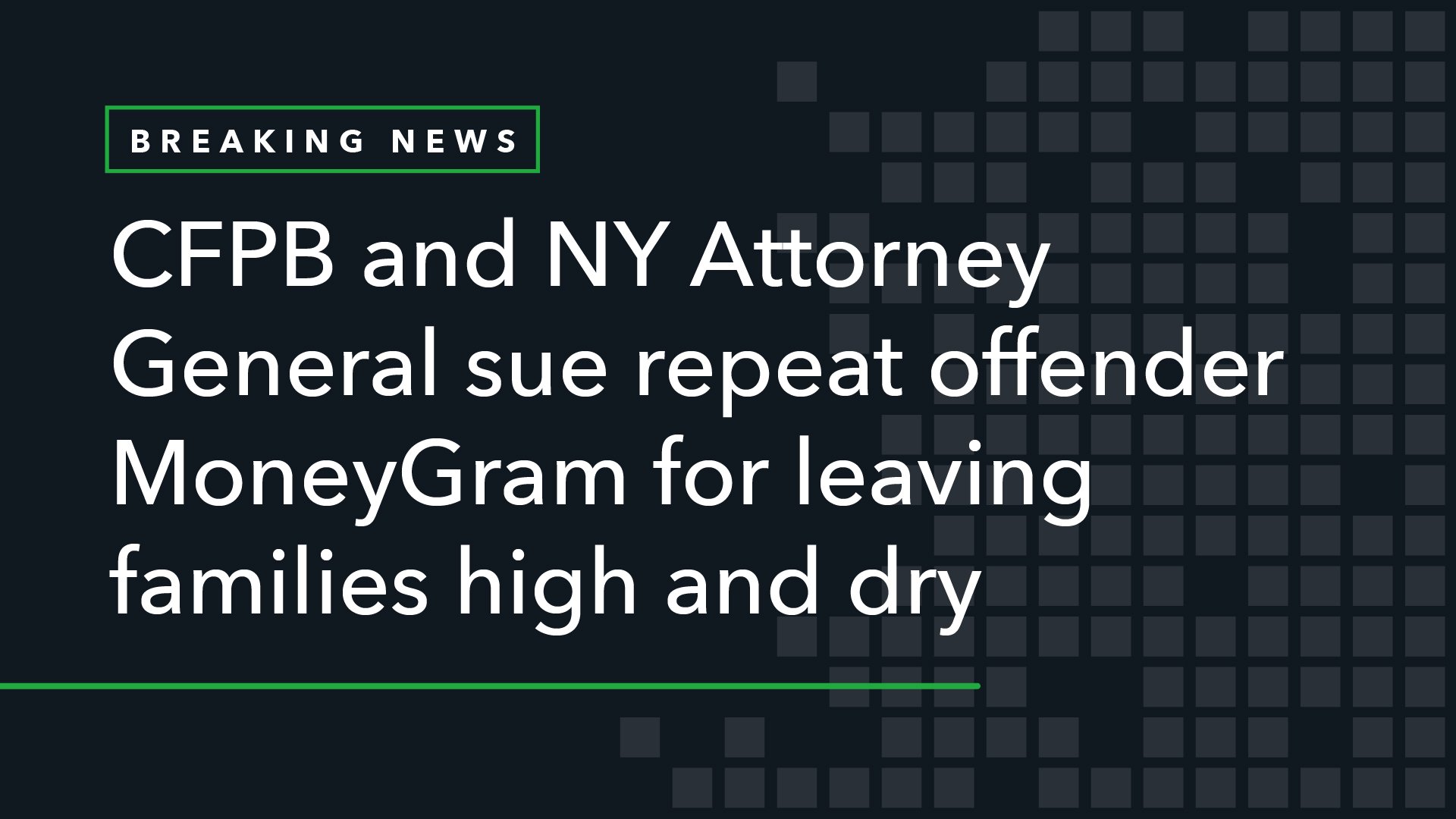Washington, D.C. – The Consumer Financial Protection Bureau (CFPB) and New York Attorney General Letitia James today announced they are filing a lawsuit against MoneyGram International, Inc. and MoneyGram Payment Systems, Inc. (MoneyGram)—one of the largest remittance providers in the U.S.—for systemically and repeatedly violating various consumer financial protection laws and leaving families high and dry. The lawsuit specifically alleges that the company stranded customers waiting for their money when it failed to deliver funds promptly to recipients abroad.
“MoneyGram spent years failing its customers and failing to follow the law, ignoring customer complaints and government warnings in the process,” said CFPB Director Rohit Chopra. “MoneyGram’s long pattern of misconduct must be halted.”
“Our immigrant communities trusted MoneyGram to send their hard-earned money back home to loved ones but MoneyGram let them down,” said Attorney General Letitia James. “Consumers deserve to know where their money went. Companies have an obligation to be transparent with consumers, treat them fairly, and follow the law, but MoneyGram repeatedly failed to do so. Today we are suing MoneyGram to correct their unlawful practices and prevent them from harming consumers. New Yorkers can trust that my office will protect them from unscrupulous companies.”
Dallas-based MoneyGram International, Inc. (NASDAQ: MGI) is a financial services company that enables consumers to send money, known as remittances. A significant portion of the company’s money-transfer transactions are initiated by immigrants or refugees in the United States sending money back to their native countries. The company’s reach is broad, operating in more than 200 countries and territories, and serving 47 million customers in 2021. The company is led by Chairman and CEO W. Alex Holmes. In 2021, it had $1.2 billion in revenue.
Thomas H. Lee Partners, L.P. and Goldman, Sachs & Co. invested in MoneyGram from as early as 2008. Then, on Feb. 15, 2022, MoneyGram announced a pending sale to Madison Dearborn Partners, LLC, a Chicago-based private equity firm, in a transaction valued at $1.8 billion, subject to regulatory approvals.
The company is subject to multiple consumer financial protection laws, including the CFPB’s 2013 Remittance Rule, which was written after Congress adopted a new set of legal protections to make remittance transfers more transparent and less risky in 2010. As one of the biggest players in the market, MoneyGram knew it had new laws to follow and that it had to change some of its ways of doing business. The company was also clearly subject to CFPB supervision after the Bureau began supervising the market in 2014.
When the CFPB began its MoneyGram examinations between 2014 and 2016, it found multiple problems. Then in 2019, the CFPB did a subsequent exam to see if MoneyGram had followed through on promises to fix its problems. In short, for more than five years, the CFPB worked with MoneyGram to fully comply with the law, but MoneyGram continually failed to do so.
Repeat Offender
MoneyGram is no stranger to financial crime and has violated law enforcement orders on multiple occasions with multiple government agencies. In 2009, the company agreed to pay $18 million to settle fraud charges brought by the Federal Trade Commission , and was required to implement a comprehensive anti-fraud and agent-monitoring program. But in 2018, after it was given ample time to implement that order, MoneyGram had to pay $125 million to settle allegations that it failed to do so. In 2012, MoneyGram agreed to forfeit $100 million and enter into a deferred prosecution agreement with the Department of Justice, admitting it criminally aided and abetted wire fraud and failed to maintain an effective anti-money laundering program. MoneyGram also violated that agreement. MoneyGram has also faced other law enforcement actions leading to significant redress and penalties.
Enforcement Action
Under the Dodd-Frank Wall Street Reform and Consumer Protection Act of 2010 (CFPA), the CFPB has the authority to take action against companies and people that violate federal consumer financial laws. The CFPB alleges that MoneyGram violated Regulation E and the Remittance Transfer Rule, which implement the Electronic Fund Transfer Act, and the CFPA. Specifically, the CFPB and New York Attorney General James allege that MoneyGram:
- Stranded customers waiting for their money: Customers paid MoneyGram to transmit money as quickly as possible but MoneyGram failed to do so and instead held up funds unnecessarily. Holding the money in limbo resulted in needless delays and harmed people who were relying on that money to pay for necessary living expenses. In addition, the company repeatedly failed to accurately disclose how long it would take to make funds available to the recipients abroad.
- Botched instructions to its employees on how to resolve disputes: MoneyGram failed to instruct or direct its employees on how to comply with laws on resolving disputes. The company also failed to report the results of its error investigations to consumers and failed to provide a written explanation of its findings to consumers.
- Neglected to develop and document policies and procedures: MoneyGram failed to put in place policies and procedures designed to ensure compliance with money-transferring laws. MoneyGram also failed to retain evidence of its compliance with certain error resolution requirements as required.
Today’s complaint seeks monetary relief for harmed consumers, an injunction to stop future violations, and imposition of civil money penalties. The complaint is not a final finding or ruling that the defendants have violated the law.
The Consumer Financial Protection Bureau is a 21st century agency that implements and enforces Federal consumer financial law and ensures that markets for consumer financial products are fair, transparent, and competitive. For more information, visit consumerfinance.gov.
Official news published at https://www.consumerfinance.gov/about-us/newsroom/cfpb-and-ny-attorney-general-sue-repeat-offender-moneygram-for-leaving-families-high-and-dry/
Images courtesy of PixaBay



